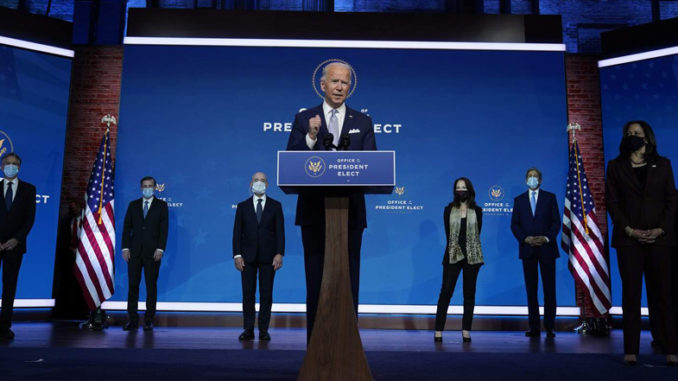

While it may be tempting to assume that the incoming administration would adopt a more nuanced approach, it remains a fact that the Obama years actually witnessed a spike in deportations, and given the mood and pressures in U.S. politics at the moment, Mr. Biden could hardly appear to be soft on immigration policy.
Mr. Biden has carefully sought to remain close to the political center so as to maximize his chances of working successfully toward bipartisan consensus. His appointments suggest he would undo many of Trump’s policy decisions. If the nearly four years under U.S. President Donald Trump led the country away from international alliances and eschewed Washington’s commitment to globalization and multilateralism, it appears that the administration of Joe Biden, Democrat and winner of the 2020 election, will aim to reverse that experience.
The recent announcement by Mr. Biden and Vice President-elect Kamala Harris that they would be inducting a raft of Obama-era policy specialists into the 46th President’s Cabinet suggests two things: first, the early months of his term will be dedicated to undoing the damage done by Mr. Trump to the U.S.’s past foreign engagement in various treaties and alliances; and second, Mr. Biden has carefully sought to remain close to the political center so as to maximize his chances of working successfully toward bipartisan consensus with the likely Senate Majority Leader from January 2021, Mitch McConnell. Consider the backgrounds of the most high-profile appointees thus far. Leading the list is Antony Blinken for Secretary of State. A former Deputy Secretary of State who served under Presidents Bill Clinton and Barack Obama, Mr. Blinken’s work to date suggests that he has an unshakeable commitment to internationalism, particularly to the U.S.’s transatlantic alliances, given his many years spent in Paris. He shares the Biden-Obama keenness to speak up against perceived human rights violations abroad, for example publicly ruing the decision for the U.S. to not intervene in the humanitarian crisis of recent years in Syria. The flip side of this zeal to get involved in such international episodes, which includes a firm commitment to ally Israel’s security, is that his views might be opposed by some Democrats farther to the left of Mr. Biden, including outspoken advocate of Palestinian rights, Michigan Congresswoman Rashida Tlaib.
Policy direction
Several other Cabinet appointments by Mr. Biden point in the same direction, including Linda Thomas-Greenfield, a senior diplomat with years of experience across Africa, shaping U.S. foreign policy in the sub-Saharan region., as the next U.S. Ambassador to the UN. Similarly, Jake Sullivan, a lawyer, a former National Security Adviser to Mr. Biden when he was Mr. Obama’s Vice President, and Deputy Chief of Staff to former Secretary of State Hillary Clinton, has been chosen for the National Security Advisor’s role.
He, along with former Secretary of State John Kerry as the Special Envoy for Climate Change, will presumably help the Biden administration carry out its top priorities for its first 100 days in the White House: a gradual reversal of the U.S.’s abrogation of the Iran Nuclear Agreement and the Paris Climate Agreement. It will certainly help that Mr. Sullivan played a critical role in negotiating the Iran deal, while Mr. Kerry was a key interlocutor in forging together the Paris accord.
On the economic front, matters may be more straightforward, if perhaps perilously poised, making Mr. Biden’s pick of Janet Yellen, the first woman to chair the Federal Reserve, as Treasury Secretary, an optimal one. She comes with decades of experience in macroeconomic policy, particularly the impact of economic growth on labor markets. Just as President Obama inherited the worst moments of the Great Recession of 2008 at the very outset of his first term, Mr. Biden will be in firefighting mode to tackle rampant joblessness and the sharpest drop in economic activity witnessed in a generation, owing to the ongoing COVID-19 pandemic. In this light, there is perhaps no one better qualified for this top job at the Treasury than Professor Yellen.
Similarly, in nominating Alejandro Mayorkas, a Cuban-American attorney and Deputy Secretary of Homeland Security under Mr. Obama, as Secretary of Homeland Security, Mr. Biden has not only sought to signal diversity within his Cabinet selection — Mr. Mayorkas would be the first Latino and first immigrant in this role — but also likely a break from the uncompromising policies of the Trump administration in handling the influx of undocumented workers across the U.S.’s southern border.
Under Mr. Trump, executive orders and administrative rules for the Immigration and Customs Enforcement were used to implement a steady crackdown on aspiring immigrants, including everything from family separations and the holding of minors in detention facilities, to the ban of issuance on green cards and skilled worker visas for new applicants. While it may be tempting to assume that the incoming administration would adopt a more nuanced approach, it remains a fact that the Obama years actually witnessed a spike in deportations, and given the mood and pressures in U.S. politics at the moment, Mr. Biden could hardly appear to be soft on immigration policy.
(The author is associate editor with The Hindu))





Be the first to comment